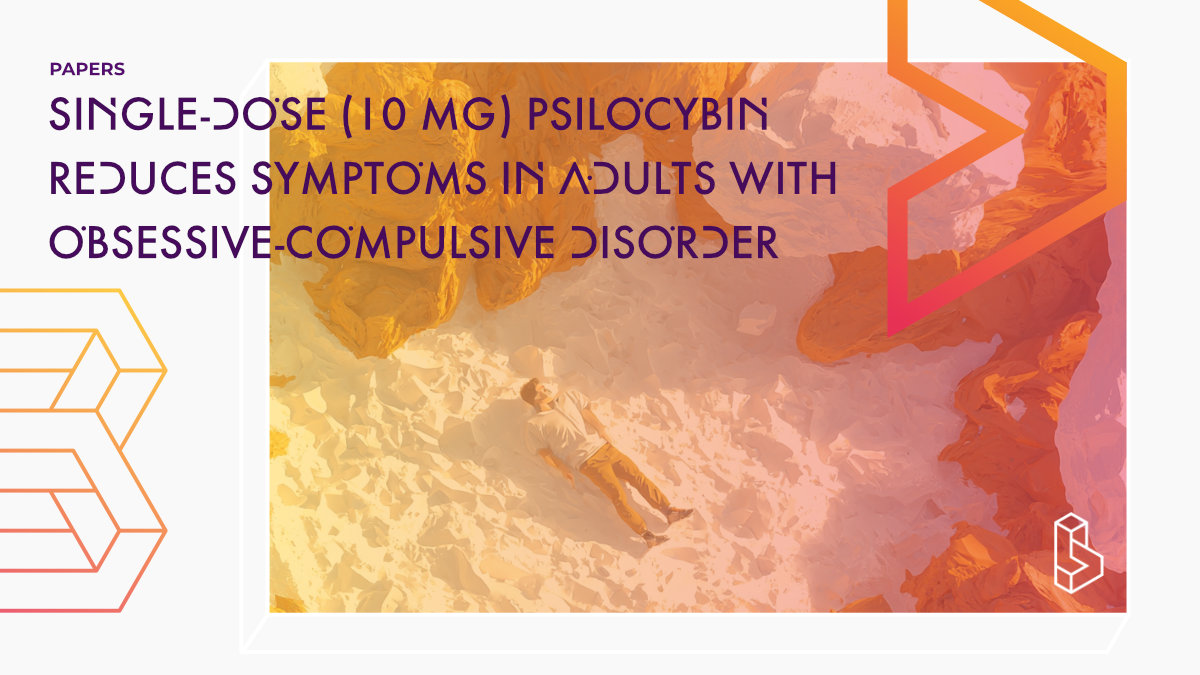This open-label study (n=19) found that 10mg oral psilocybin produced a significant reduction in OCD symptoms compared to 1mg, with a large effect size (Cohen’s d = 0.82) one week after dosing, particularly for compulsions rather than obsessions, though effects diminished over subsequent weeks.
Abstract of Single-dose (10 mg) psilocybin reduces symptoms in adults with OCD
“Background Obsessive-compulsive disorder (OCD) is a common and disabling condition. A large proportion of patients fail to respond to first-line treatment with serotonin reuptake inhibitors either selective serotonin reuptake inhibitors (SSRIs) or clomipramine. Preliminary evidence suggests psilocybin, a serotonin receptor agonist, might be efficacious. We conducted a pharmacological challenge study to investigate the efficacy and mechanisms of effect of psilocybin in OCD. This analysis reports the clinical outcomes only.
Methods Participants with a diagnosis of OCD of at least moderate severity, received two single doses of oral psilocybin, 1 mg followed by 10 mg, administered in fixed order separated by 4 weeks. On the day of dosing, they were treated in a day-care facility in the presence of clinicians experienced in the use of psychedelics for treating mental disorders. Psychological support was provided before, during and after dosing. Participants and raters were blinded to the order of treatment. They were assessed on the day before each dose (baseline 1, 2), on the day of dosing and at intervals over a 4-week period afterward using the Yale-Brown Obsessive Compulsive Scale (Y-BOCS) (primary clinical outcome) and secondary clinical outcomes including the Montgomery-Åsberg Depression Rating Scale (MADRS). Adverse effects were also recorded.
Results Nineteen adult participants (aged 20–60) entered the study and 18 completed all assessments. Clinical outcomes following 1 mg and 10 mg psilocybin were compared using a linear mixed-effects model and ANOVA. A significant between-dosage effect favouring 10 mg psilocybin was found one-week after dosing on the Y-BOCS (Cohen’s d = 0.82, p = 0.002). In particular, the effect one-week after dosing was statistically significant on the compulsion subscale of the Y-BOCS (Cohen’s d: 0.74, p = 0.003), compared to obsession (Cohen’s d: 0.50, p = 0.06). The effect diminished over the subsequent 3 weeks. No effect of psilocybin was detected on the MADRS. Psilocybin was well tolerated, with few adverse events reported at both dosages and no serious adverse events.
Conclusions In this study, which was limited by a small sample size and the absence of randomisation, a 10 mg dose of oral psilocybin was found to be well-tolerated and potentially efficacious in patients with OCD. Psilocybin produced a rapid-onset, moderate to large effect on compulsive symptoms, which lasted up to one week after dosing. Future randomised placebo-controlled clinical trials investigating a longer course of multiple weekly doses of 10 mg psilocybin are indicated in OCD and in other obsessive-compulsive and related disorders characterised by compulsions.”
Authors: Luca Pellegrini, Naomi A. Fineberg, Sorcha O’Connor, Ana Maria Frota Lisboa Pereira De Souza, Kate Godfrey, Sara Reed, Joseph Peill, Mairead Healy, Cyrus Rohani-Shukla, Hakjun Lee, Robin L. Carhart-Harris, Trevor W. Robbins, David J. Nutt & David Erritzoe
Summary of Single-dose (10 mg) psilocybin reduces symptoms in adults with OCD
Obsessive-compulsive disorder (OCD) affects roughly three per cent of the population and is characterised by intrusive obsessions and repetitive compulsions that severely impair daily functioning and quality of life. Conventional treatments, particularly selective serotonin-reuptake inhibitors (SSRIs), clomipramine and exposure-and-response-prevention therapy, leave around one-third of patients with clinically significant symptoms. Against this backdrop, the authors explored psilocybin, a serotonin 5-HT2A agonist, as a novel pharmacological option. Early open-label work suggested that even low doses might ameliorate compulsive symptoms without provoking intense psychedelic experiences, a feature that aligns with the risk-averse temperament often seen in OCD.
Building on this rationale, Pellegrini and colleagues conducted a pharmacological-challenge study comparing a single “mild” 10 mg dose of psilocybin with an ultra-low 1 mg dose intended as an active control. The core hypothesis was that 10 mg would deliver a measurable, rapid reduction in OCD severity while remaining tolerable and largely blindable.
Methods
Study design
Find this paper
https://doi.org/10.1016/j.comppsych.2025.152619
Open Access | Google Scholar | Backup | 🕊
Cite this paper (APA)
Pellegrini, L., Fineberg, N. A., O'Connor, S., De, A. M. F. L. P., Godfrey, K., Reed, S., ... & Erritzoe, D. (2025). Single-dose (10 mg) psilocybin reduces symptoms in adults with obsessive-compulsive disorder: A pharmacological challenge study. Comprehensive Psychiatry, 152619.
Study details
Compounds studied
Psilocybin
Topics studied
Obsessive-Compulsive Disorder
Study characteristics
Original
Open-Label
Within-Subject
Participants
19
Humans
Compound Details
The psychedelics given at which dose and how many times
Psilocybin 1 - 10mg | 2x

